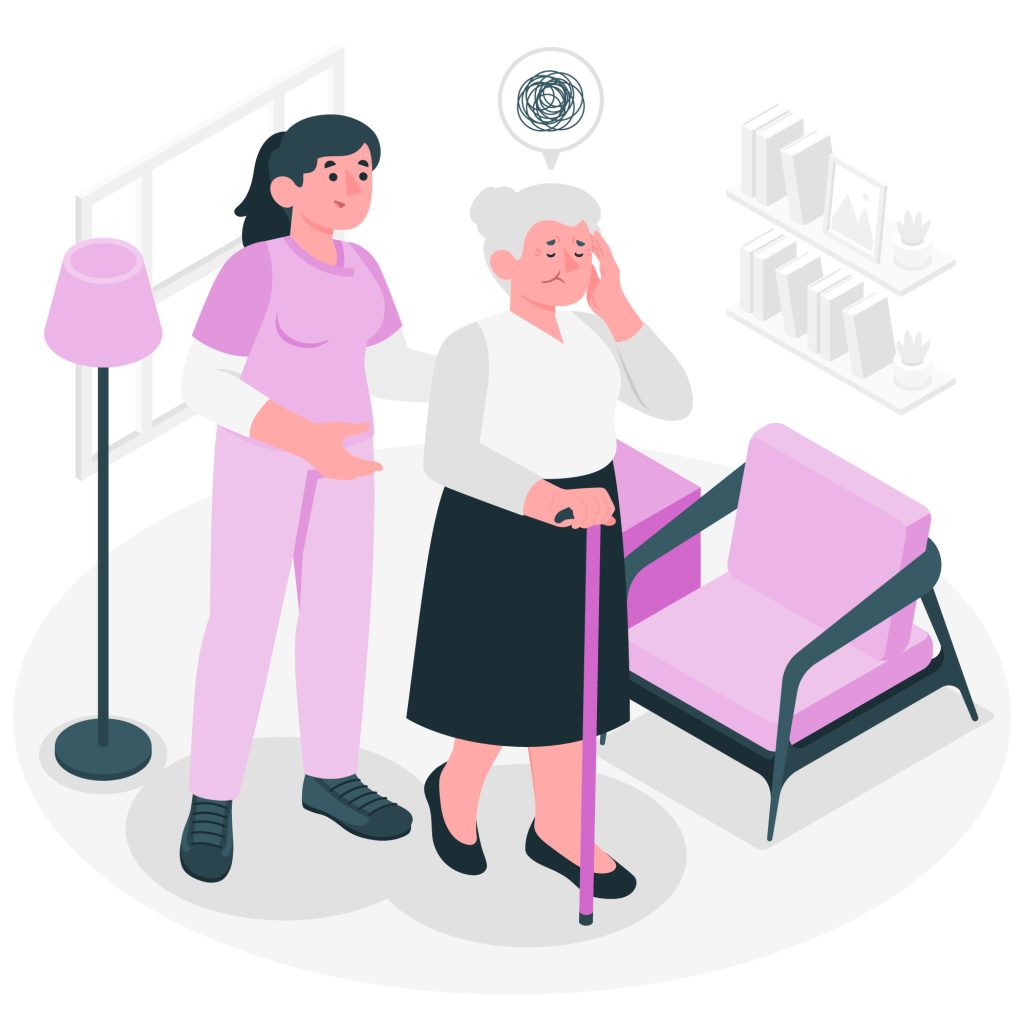Caring for a loved one with Alzheimer’s can be a difficult and emotionally challenging experience. However, it is important to remember that you are not alone in this journey. Many others are facing similar challenges, and support is available to help you through this difficult time. Here are some tips for caring for someone with Alzheimer’s that can help make the experience a little easier.

The basics of Alzheimer's disease
Alzheimer’s disease is a neurological disorder that affects memory, cognition, behavior, and other important functions. Alzheimer’s is progressive and slowly worsens over time. Alzheimer’s is the most common type of dementia, an overall term for loss of memory and other cognitive abilities along with changes in behavior. Experts believe the causes of Alzheimer’s involve genetic, lifestyle, and environmental factors that affect the brain leading to a decline of its cells. Alzheimer’s symptoms usually appear gradually, which can make them hard to detect initially. It begins with mild memory impairments, such as difficulty recalling recently learned information, followed by confusion and disorientation, eventually leading to severe cognitive impairment, including difficulty speaking coherently or recognizing family members or friends. While there is currently no known cure for Alzheimer’s disease, treatments, and medications exist that aim at managing its symptoms.
Alzheimer's symptoms
There are a number of different symptoms associated with Alzheimer’s disease. These can range from mild to severe, and they may be experienced in different ways by different people. In general, however, the most common symptoms include memory loss, difficulty with language and communication, difficulty with executive functioning (such as planning and problem-solving), and changes in mood or behavior. While Alzheimer’s symptoms can be difficult to deal with, it is important to remember that they do not necessarily mean that someone has Alzheimer’s disease. If you are concerned about any of these symptoms, it is important to speak to a doctor for a proper diagnosis.
Causes of Alzheimer’s
Alzheimer’s disease is a debilitating neurological condition that affects millions around the world. Although Alzheimer’s causes are still under extensive scientific research, one of the most widely accepted theories defines Alzheimer’s as being caused by a combination of genetic, age-related and lifestyle factors. These can range from having an increased genetic risk and over time developing a buildup of certain proteins in the brain, to smoking or even having high blood pressure. Regardless of what factors may be at play, it is essential to understand that Alzheimer’s is a complex condition, and future studies will likely expand upon current findings about Alzheimer’s causes so that more individuals receive effective prevention and treatment.
Caring for a spouse with dementia
Caring for a spouse with dementia can be an overwhelming and daunting experience. Finding a balance between being supportive while also protecting them from harm requires patience, understanding and creativity. To ensure that care is safe, effective and appropriate, it is important to understand dementia symptoms and how to respond. It may be beneficial to reach out to dementia support groups as well as doctors who specialize in dementia care for guidance. In addition, reliable dementia programs can provide valuable information about available services that may benefit the dementia spouse and their caregivers. Taking all of these steps will help minimize stress and ensure that the dementia spouse has the best possible quality of life.
How to communicate with someone who has Alzheimer's
For Alzheimer’s patients, communication can be especially challenging. It is important to understand the unique cognitive decline associated with Alzheimer’s and be mindful that some form of communication is still possible. Alzheimer’s patients often suffer from a decline in self-expression through language, struggling to respond appropriately or initiate conversations. However, a supportive environment of mutual respect and understanding can help foster connections and reduce stress. Speaking at a slow and moderate rate, encouraging physical touch with light hand gestures, maintaining compassion in one’s demeanor, and listening for comprehension rather than content are all utilized strategies when communicating with Alzheimer’s patients.

Tips for providing care to someone with Alzheimer's
As a dementia caregiver, you may find yourself facing the challenging yet rewarding task of providing care to someone with Alzheimer’s. It is important to stay patient and understanding when caring for someone that has dementia, as their behavior and mental state can quickly change or deteriorate without warning. To ensure proper care is provided, dementia caregivers should take time to listen and observe their loved one, staying mindful of needs that can be hard to detect yet are essential. Keeping up with daily routines, using a positive communication style, providing stimulation through mentally engaging activities, and seeking professional help as needed – all of these can be beneficial dementia caregiver tips for anyone looking after someone with dementia.
Dealing with difficult behaviors associated with Alzheimer's
Alzheimer’s disease can present immense challenges when handling Alzheimer’s-related difficult behaviors. It is important to take a proactive yet gentle approach when trying to manage these behaviors. Taking a moment to identify the source of frustration and providing distractions or redirecting attention can help alleviate disruptive behaviors. Additionally, creating a comfortable and secure environment with familiar items and people can be beneficial in reducing such behaviors. Above all, it is crucial to remember that Alzheimer-related behaviors stem from the person’s condition, not the individual’s will; patience and understanding should be key components of any response.
Taking care of yourself while caring for someone with Alzheimer's
As a dementia caregiver, it is important to prioritize taking care of yourself while caring for someone with Alzheimer’s. Self-care can boost both your physical and mental health – which is essential when managing the daily challenge of dementia caregiving. Research shows dementia caregivers often suffer from burnout due to an increased feeling of isolation, lack of support, and greater financial and emotional pressure. To ensure your well-being is maintained during this stressful time, make use of dementia caregiver support in the form of respite services, understanding advice from healthcare professionals, dementia-specific online resources, and elderly caregiver support groups. These supports can provide invaluable insights into dementia and dementia caregiving which will help you through a very trying time.
Last Word
Alzheimer’s disease is a serious condition that affects many people. There are some basic steps you can take to communicate with someone who has Alzheimer’s, provide care, and deal with difficult behaviors. It is also important to remember to take care of yourself while caring for someone with Alzheimer’s. These steps will help you provide the best care for your loved one.
Frequently Asked Questions
Dementia caregiving is an emotionally and physically draining endeavor, and dementia caregivers often face a number of difficult challenges. Common challenges include providing around-the-clock supervision, dealing with increased anxiety and aggression from the dementia patient, managing medication regimens, grappling with notification of friends and family members about their relative’s condition, navigating the medical system and legal issues such as guardianship, and ultimately mourning the dementia patient’s decline. Dementia caregiving requires a unique set of skills to support both the dementia patient and the dementia caregiver in a holistic manner throughout their journey together.
The role of dementia caregivers is important but often overlooked. It’s easy to think dementia can be managed with medication or with professional support, but the truth is that dementia caregivers have an integral role in supporting a person with dementia. Caregivers must be patient, understanding, and committed to helping the person develop strategies for dealing with dementia symptoms. They should also strive to create a safe and comfortable environment that encourages meaningful communication between the person living with dementia and everyone around them. Adding touches like music or photographs can make all the difference in calming anxious moments and providing comfort. It doesn’t take much effort on the part of dementia caregivers to help create a supportive atmosphere for someone facing these challenges.
For dementia caregivers, managing stress can be a daunting task. The best way to manage stress is to make sure you find time for yourself and recognize when you need a break. Regularly taking walks, listening to music, or getting seven to eight hours of sleep nightly can help lower stress levels. Other methods include engaging in activities that bring joy such as reading, drawing, and playing board games with family members. Furthermore, dementia caregivers should make sure they have a strong network of support – friends, family members, and dementia care services – who can provide assistance throughout the journey. Making use of their networks can go a long way in providing relief and reducing stress.




